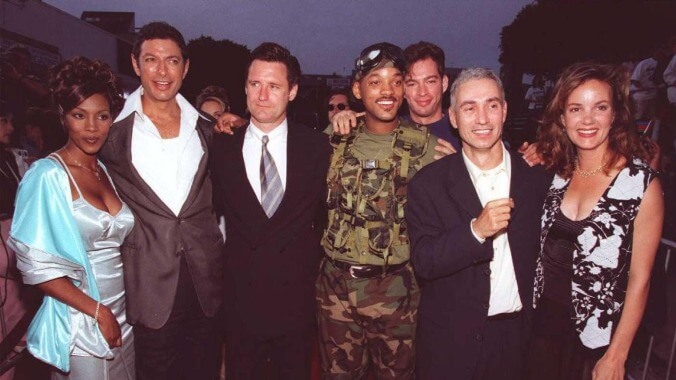The studio thought Will Smith would wreck Independence Day's global box office
In a new oral history of the film, writer-producer Dean Devlin and director Roland Emmerich detail the fight to get Smith cast

It’s not hard to peg Roland Emmerich and Dean Devlin’s Independence Day as the moment Will Smith went from “Will Smith, well-known rapper and potentially promising sitcom actor” to “Will Smith, no further qualifiers needed.” Building off the previous year’s Bad Boys, Independence Day transformed Smith into the go-to Hollywood blockbuster star of the next several years, comfortable with comedy and action alike. But, as revealed in a new Hollywood Reporter oral history of the film, it almost didn’t happen—because studio executives were convinced that international movie markets wouldn’t respond to a Black lead.
Or, as remembered by Devlin: “You cast a Black guy in this part, you’re going to kill foreign [box office].” But the writer-producer and his directing partner put their feet down, stating that they just might take their project over to Universal (which had bid heavily on the film’s explosive script) if they didn’t get their choice of leads. (It eventually turned out that, hey, international audiences would go see a movie with a Black man in the lead part, to the tune of a record-shattering performance.) It’s one of several fascinating stories from the oral history, which also includes Jeff Goldblum waxing nostalgic about talking jazz with Brent Spiner, early ideas to have Kevin Spacey play the film’s heroic president, and a number of odd asides from Randy Quaid (including that the film “had no press tour” and that he won a bundle playing at a casino during the shoot).
The primary focus is on Devlin and Emmerich, though, who track the whole history of the project, from the rush to beat Tim Burton’s similarly-themed Mars Attacks to theaters, to the fight to use the movie’s big White House explosion in commercials, to eventually sitting in the White House, hanging out with Bill and Hillary Clinton as they watched the film. (Also, apparently Bill Pullman’s big speech was a placeholder; Devlin always assumed he’d re-write it, but never got around to it before it had to be shot.)
All in all, it’s a fantastic read, culminating in a recounted conversation with Steven Spielberg, who praised the duo’s film, declaring—correctly, as Steven Spielberg so often has been—“You guys reinvented the blockbuster. After this movie, nobody can do a normal blockbuster anymore.”